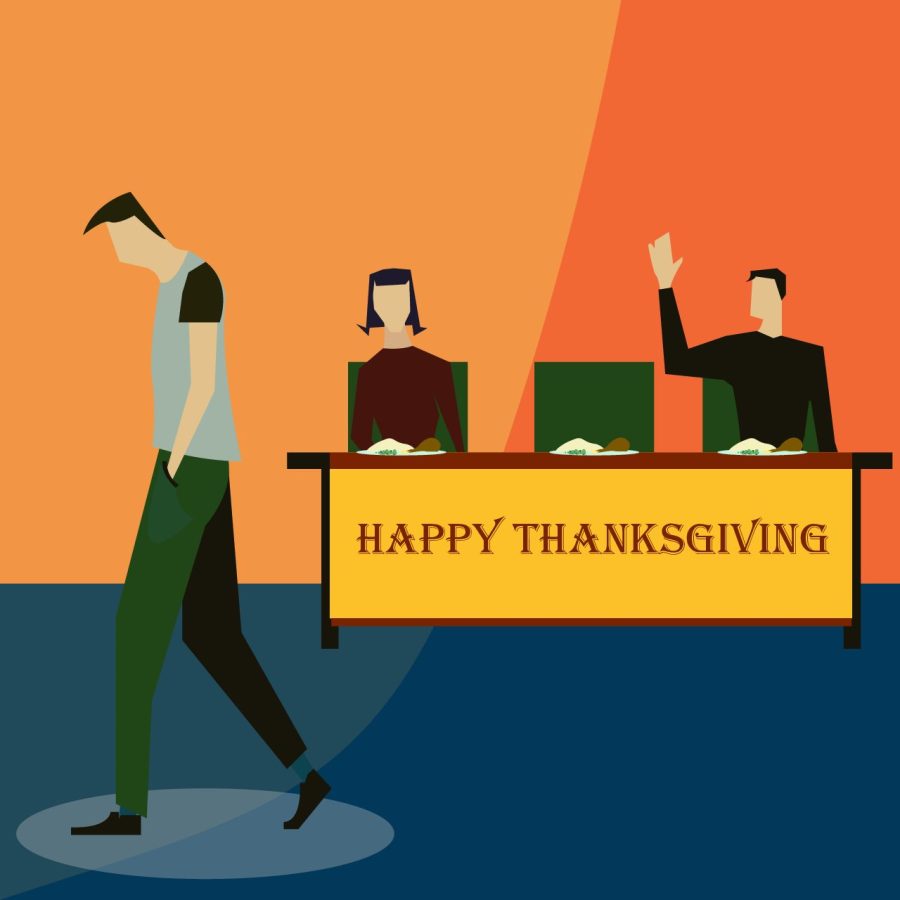Editorial — A better way to celebrate Thanksgiving
November 16, 2022
As we near Thanksgiving break, many of us are longing to return to our hometowns and reunite with family and friends for the holiday. The longstanding tradition in American society is to clasp hands with loved ones and share a bountiful feast, containing classic dishes like mashed potatoes, green bean casserole and baked turkey.
Or closely gather in your relatives’ living room to watch football.
Nevertheless, we have been taught from a young age to commemorate the Thanksgiving holiday in honor of the historic breaking of bread between European colonizers and Native Americans. From our experiences in the American elementary school system, the Thanksgiving story was always told as a peaceful one — the two groups meeting in agreement about the use of resources and land in the “New World.”
It was disheartening for us to later learn that quite the opposite is true.
While it is certain that celebrations of thanks took place as colonizers ventured to the Americas, with the first dating back to 1619, the story of the Native Americans teaching the Pilgrims how to harvest the land and survive the changing seasons is mostly fiction. The two groups did not live happily ever after for the years to come.
Well, only one group did.
While Wampanoag tribe leader Massasoit negotiated a treaty to ensure peaceful commerce between his tribe and the Pilgrims upon their arrival in North America, his passing away in 1661 — coupled with an influx of some 25,000 European colonizers — caused tensions between the two groups to rise.
In addition to the spread of disease, which killed more than half of the indigenous population, the two groups began to attack each other. While Wampanoag tribe members were trying to protect their land and resources, the Europeans were on a quest to claim it for themselves. The resulting conflict, which was won by the Europeans, led to the loss of life on both sides.
However, the Indigenous population was never able to fully recover. The Europeans continued their conquest of Indigenous land as more people sailed across the Atlantic Ocean in the hope of a new life.
But besides the dark history of this American holiday, there are several other reasons why its celebration is overrated. When it comes down to it, the holiday is simply promoting gluttony. Thanksgiving is the one day out of the year that you are encouraged to eat and eat and continue eating until you are hyperventilating from the meat sweats.
This gluttony is rooted in the commercialization of America and our inherent need to constantly consume things, whether it be food, clothing or other goods and services that are not necessities. Thanksgiving is not the only holiday that promotes these ideals. In fact, all holidays do.
Come Christmastime, we will be encouraged by commercials, department stores and online advertisements to buy gifts for everyone we know. Valentine’s Day follows closely behind, a textbook example of a meaningless holiday that big corporations profit from by selling cheap chocolates and poorly made stuffed animals. The list is endless, with every month of the year seeming to have something that must be exuberantly celebrated.
With that, if you are looking for a better way to spend your Thanksgiving holiday this year, we have the perfect alternative for you.
The Native American Student Association (NASA) will be hosting its annual First Nations Food Taster event on Nov. 28 at the Northern Center from 5 to 7 p.m. Members of the Marquette community are encouraged to sample meals and other treats from the Decolonizing Diet Project Cookbook, which was created by professor of Native American studies Martin Reinhardt.
In addition to enjoying an Indigenous meal, live music and other performances will take place. A silent auction will run throughout the night, which will include artwork from members of NASA.
The First Nations Food Taster is NASA’s main source of revenue for their annual powwow celebration, which is held during the spring. Tickets for the Food Taster can be purchased on the NMU Ticket Office website.
Editor’s Note: The North Wind is committed to offering a free and open public forum of ideas, publishing a wide range of viewpoints to accurately represent the NMU student body. This is an editorial, written by the North Wind Editorial Board in its entirety. It reflects the majority views of the individuals who make up the editorial staff of the North Wind. It is the policy of the Editorial Board not to endorse candidates for any political office, in order to avoid aligning this public forum with particular political organizations.


























